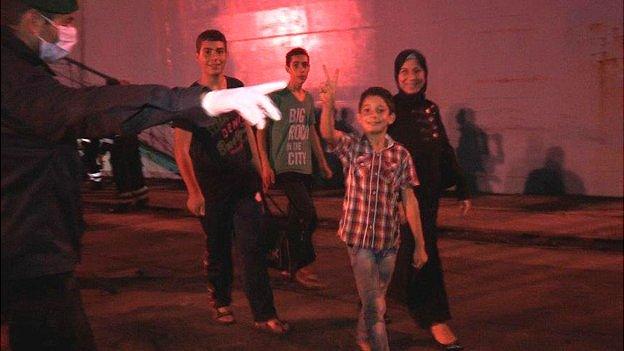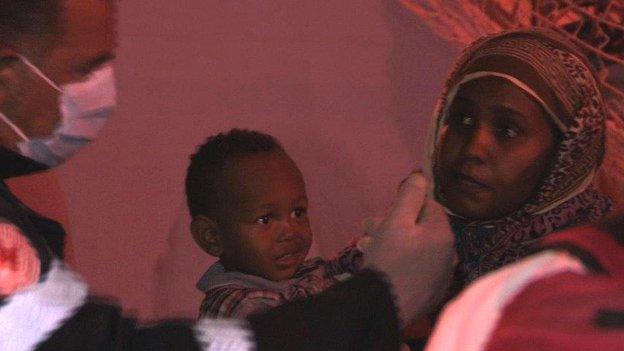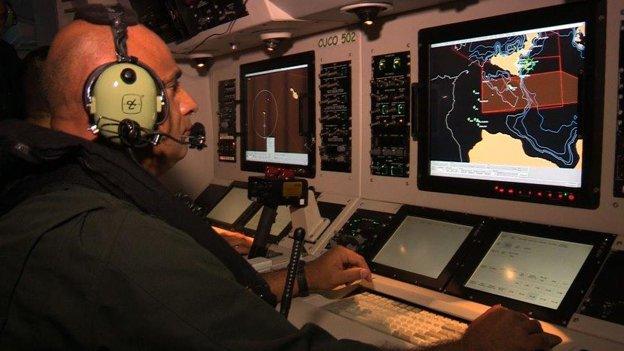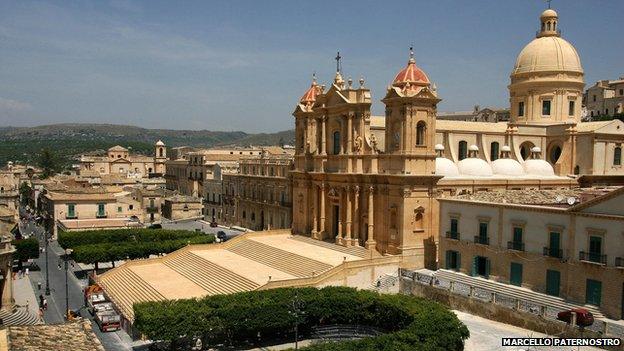Mediterranean migrant surge stretches Italy's resources
- Published

More than 140,000 migrants have arrived on Italy's shores so far this year and Sicily is handling the bulk of them.
A cargo ship pulls into port and the sick are led off first, followed by the pregnant women. I count five who must be full-term - the ship is three hours late docking because one lady has already gone into labour on board and has had to be airlifted to hospital.
Most of the migrants are African - Nigerian, Sudanese or Eritrean.
They all file down the gangplank onto the quayside with the same impassive, bewildered gaze. They squint into the sulphur floodlights, at the swarms of police, charity workers and doctors who surround the boat, documenting and dividing them into groups.
The barefoot and poorly shod are handed fluorescent, coloured flip-flops or garish plastic sandals - the migrants hold them high in front of them as if they are visa or identity papers, some proof of belonging.
A boy of about 10, wearing a chequered bomber jacket, suddenly jumps in front of our camera and gives us a double thumbs-up, jiggling with excitement about being on the telly.
His headscarfed mother puts her arm around him proudly and beams into the lens, chattering quickly in Arabic and indicating that the two other teenage children behind her are also hers.
With the help of an NGO welfare worker I snatch fragments of her story - her husband has been killed, she's a Christian, I think she's Syrian and has come to Europe to give her children a future.

She's gesticulating, anxious to make me understand the details of her narrative, but a policeman shouts angrily at us and herds her away into a holding area.
At the migrant programme's co-ordination centre there a giant electronic map is marked with green dots, indicating interceptions.
The incidents are now so frequent that off the coast of Libya there is barely a chink of blue sea visible; the Mediterranean has been permanently stained emerald.
In the Sicilian coastal town of Siracusa the local mayor has just been informed of the 200 new arrivals on the cargo ship.

"It's like a tap that you can't turn off - every day there are more," he tells me, shaking his head wearily.
We walk together along the seafront and he taps the railings with his hand.
"Am I wrong," he asks rhetorically, "or is this frontier Europe's frontier, as well as Italy's? So isn't this Europe's problem and not just ours?"
The Italian government says it is sinking under the exorbitant cost of saving lives at sea and is calling upon the European Union's border agency, Frontex, to take over.

EU's migrant pressure
More than 165,000 irregular migrants have tried to get to Europe by boat across the Mediterranean this year - nearly three times the 2013 total
Almost half of them were Syrians and Eritreans, the UN refugee agency UNHCR says
Migrant boats often set sail from troubled Libya - they are generally overcrowded, often unseaworthy
If Italy is their point of arrival in the EU it is Italy's duty to process asylum seekers' claims

Frontex's remit is to protect Europe's frontiers and detect who is crossing them illegally. Ironically it is now no longer repelling illegal immigrants but is caught up in the mission to rescue them.
In a small plane 800 metres (2,640 ft) above Siracusa a tanned, young pilot, Capt Cicuda, shows me the sophisticated radar and surveillance equipment they are using to detect boats in trouble.
Frontex has no operational equipment of its own - this plane is borrowed from Spain - and it is not allowed to fly over the North African coast, where most of the shipwrecks have occurred, but must stay closer to Europe's shores, explains Capt Cicuda.

The captain and his plane are only here for a month - after that, Frontex must rely on the goodwill of another EU member state to replace them.
Frontex has called urgent meetings to try to rally its partners - the mission is also running out of money.
We're forced to break off our interview because of sudden turbulence - we are flying into a storm and I need to fasten my seat belt.
The rain thrashes against my window and the wind hurls and boots the aircraft over and under the heavy clouds. Winter is on the way and the Mediterranean below us will only get more treacherous.
On the quayside the steady drip feed of migrants from the cargo ship continues.
This time all were saved, but next time?
I spot the Syrian boy in the bomber jacket dancing impatiently as he waits with his family to be bussed to the already heaving asylum centres.
His mother catches my eye and grins at me confidently, raising her hands to the heavens in a gesture implying thanks to God it's all over.
But I think it's only just beginning.
How long before she understands that she's washed up on the shores of a Europe that neither wants her, nor knows what to do with her?
How to listen to From Our Own Correspondent, external:
BBC Radio 4: Saturdays at 11:30
Listen online or download the podcast.
BBC World Service: Short editions Monday-Friday - see World Service programme schedule.